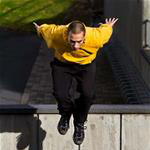What makes a good parkour spot
Parkour is a thrilling and challenging sport that requires agility, strength, and creativity. It involves moving through obstacles in the environment in the most efficient way possible. However, not all locations are suitable for parkour training. To get the most out of your parkour practice, you need to find a good spot that offers a variety of challenges and opportunities for movement. In this blog post, we will explore what makes a good parkour spot and provide tips on how to find one.
Where can you train parkour?
Parkour training has always taken place in various surroundings, mostly in structures that are characteristic of urban spaces but also in parks, even in the woods. The best places are easily accessible, firm, and have interesting structures that promote creative movement.
Traceurs call their training places spots. Good spots are well known and recognised among the practitioners and they are often named according to the location, qualities, structures, buildings, or companies nearby the spot. In parkour training, it's typical to wander around and explore the surroundings in hopes of finding a good spot.
It's also typical that traceurs gather in a familiar spot for certain structures or to train a certain skill. With creative thinking, even an old spot can offer new possibilities session after session. A good old spot is also a good way to measure your performance level. Old challenges can be tested every time you come back to the spot.
Features of a perfect parkour spot
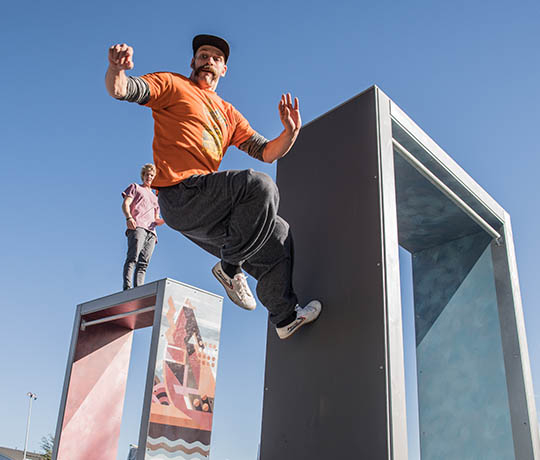
Traceur practicing parkour
Easy to access and safe
A perfect training spot has many special features like easy access, which means two things. First of all, you can train there without disturbance. Secondly, the spot is not too far away from the places people use in their everyday life or you can easily get there by public transport. On the other hand, traffic through the spot makes training harder no matter how good the spot is structural.
The structures of the spot must be strong and durable. If a railing collapses when you land on it, you could get injured and/or fined for breaking someone’s property.
It's good to have a lot of various structures in a small area. Wandering while training is fun occasionally, but usually, it's better if you're not forced to move too far just to find a certain shape or structure.
Enough scale of difficulty for different skill levels
Urban spots are sometimes monotonous with only one or two types of structures repeating themselves. Thus you have to choose beforehand, what kind of sport-specific training you want to do and then find a matching spot.
You also might have to choose the training partners according to the spot, if the spot doesn't offer enough scale of difficulty for different skill levels. In parkour, it's essential to combine movements to create many kinds of runs and lines. In order to do that it’s good to have obstacles rather close to each other instead of having to run a long way just to combine a movement with another.
A good spot also offers some unique and unexpected structures. A good spot surprises you even after a long time often thanks to the versatility and small details, that wake your interest again and again or that you just haven't noticed before. Unexpected structures challenge you to creative thinking and problem-solving.
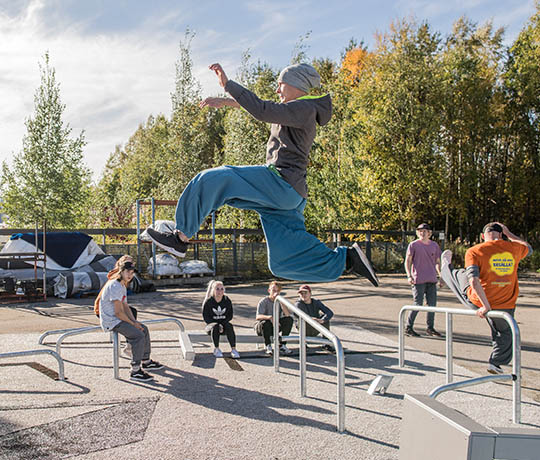
Parkour enthusiast jumping on a parkour park
Why build parkour areas?
The well-designed parkour-specific environment can put together all the good qualities of a perfect parkour spot and add some extra factors as well.
One of these factors is safety. A good parkour area is designed according to the safety standard. Material choices and equipment placement can highly promote overall safety compared to street spots while maintaining challenges that are essential to the sport. Built parkour parks are placed away from distractions such as traffic or playgrounds filled with surprising elements that could lead to injuries while people train in the park.
It's also socially more acceptable to train in a parkour park versus street spots: you can jump, trick and fool around without disturbing others and possibly feeling stupid.
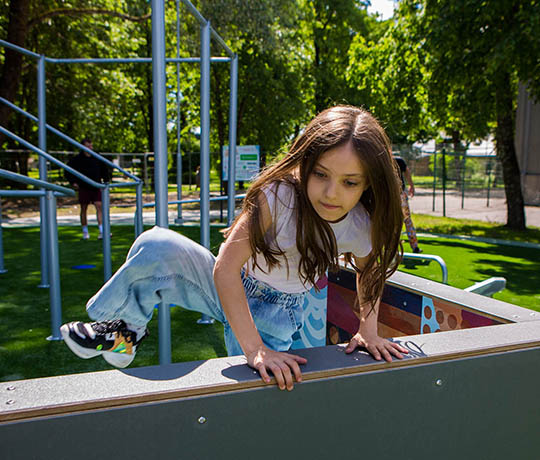
A young girl with long hair, wearing a white shirt and light blue jeans, is climbing over a piece of playground equipment. The background shows a sunny park with green trees, outdoor exercise equipment, and other people in the blurred distance.
Easy access for beginners of parkour
At its best, a parkour area gives beginners easy access to the sport and lures people intuitively to create parkour-like movement.
Inclined surfaces and differences in heights and distances make the basic training easier while diversity and variation keep up the interest and make experienced traceurs test their limits.
Well-designed areas are also not only suitable but really good for teaching the sport thanks to high safety and different degrees of difficulty inside just one park.
The visuality of a parkour park
A big part of the parkour phenomenon has always been the visual culture of photos and videos.
The visuality of a parkour park can support this visual culture at its best. Good, exciting, original enough, street-like looks can and will inspire practitioners visually.
A good parkour area like this can help different ages and skill levels learn, meet and learn from each other and even create a community that fosters the same idea of creative, lifelong moving.
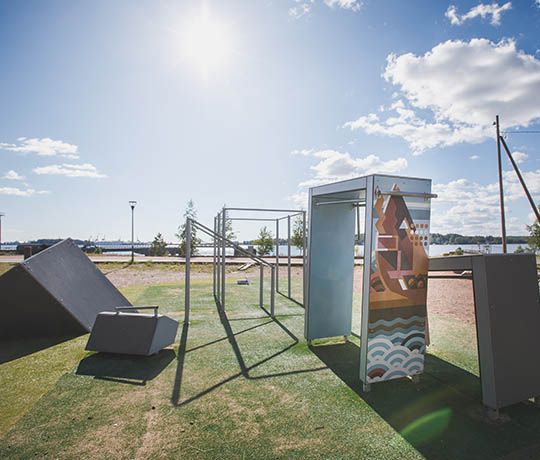
Parkour park located in Kotka, Finland
